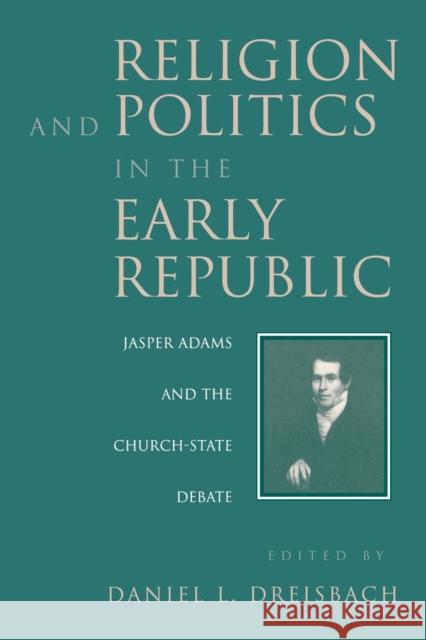Religion and Politics in the Early Republic: Jasper Adams and the Church-State Debate » książka
Religion and Politics in the Early Republic: Jasper Adams and the Church-State Debate
ISBN-13: 9780813108803 / Angielski / Miękka / 1996 / 240 str.
The church-state debate currently alive in our courts and legislatures is strikingly similar to that of the 1830s. A secular drift in American culture and the role of religion in a pluralistic society were concerns that dominated the controversy then, as now. In Religion and Politics in the Early Republic, Daniel L. Dreisbach compellingly argues that the issues in our current debate were framed in earlier centuries by documents crucial to an understanding of church-state relations, the First Amendment, and our present concern with the constitutional role of religion in American public life. Reflection on this national discussion of more than 150 years ago casts light on both past and future relations between church and state in America.In an 1833 sermon, "The Relation of Christianity to Civil Government in the United States," the Reverend Jasper Adams of Charleston, South Carolina, an eminent educator and moral philosopher, offered valuable insight into the social and political forces that shaped church-state relations in his time. Adams argued that the Christian religion is indis-pensable to social order and national prosperity. Although he opposed the establishment of a state church, he believed that a Christian ethic should inform all civil, legal, and political institutions.Adams's remarkably prescient discourse anticipated the emergence of a dominant secular culture and its inevitable conflict with the formerly ascendant religious establishment. His treatise was the first major work from the embattled religious traditionalists controverting Thomas Jefferson's vision of a secular polity and strict church-state separation.Eager to confirm his analysis, Adams sent copies of the sermon to scores of leading intellectuals and public figures of his day. In this volume, Dreisbach brings together for the first time Adams's sermon, a critical review of the treatise, and transcripts of previously unpublished letters written in response to it by James Madison, John Marshall, Joseph Story, and J.S. Richardson. These letters provide a rare glimpse into the minds of several influential statesmen and jurists who were central in shaping the republic and its institutions. The Story and Madison letters are among their authors1 final and most perceptive pronouncements on church-state relations.The documents that Dreisbach has assembled in this edition provide a vivid portrait of early nineteenth-century thought on the constitutional role of religion in public life. Our ongoing national discussion of this topic is illuminated by the debate encapsulated in these pages.











